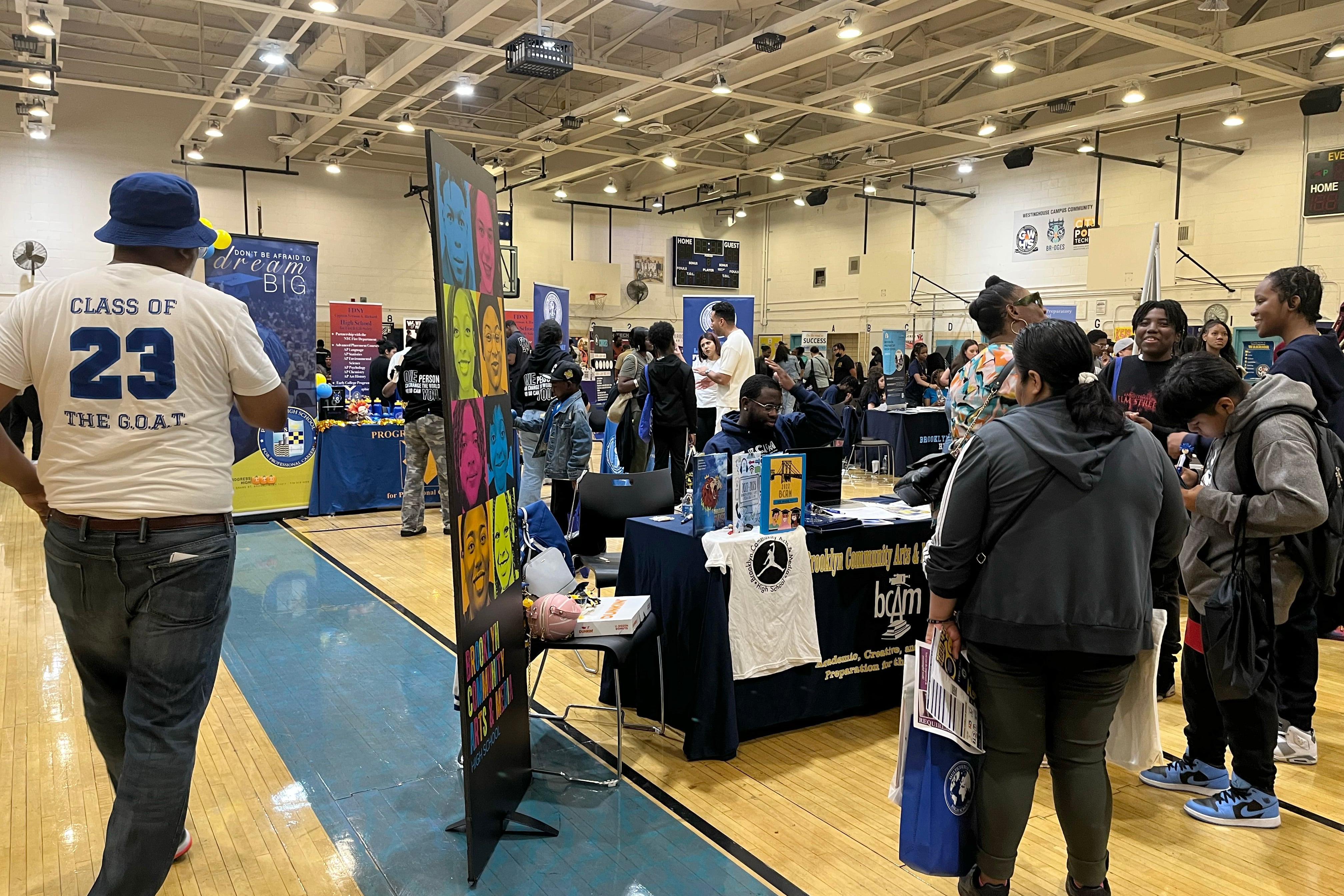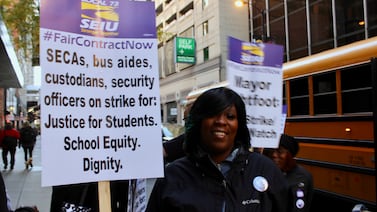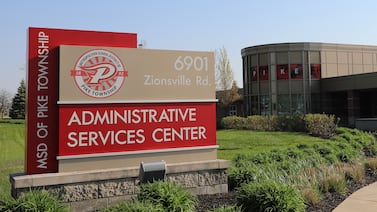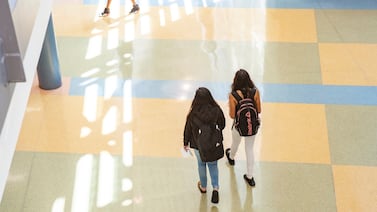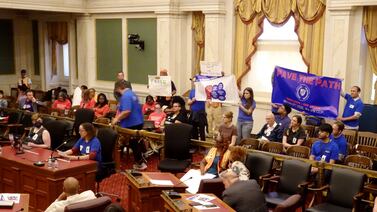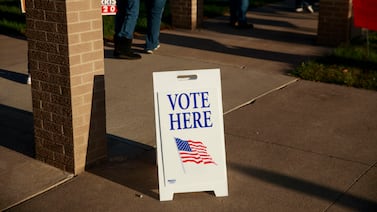Sign up for Chalkbeat New York’s free daily newsletter to keep up with NYC’s public schools.
With a month left to go in New York City’s notoriously complex high school admissions process, families are striving to determine which of the city’s more than 700 programs across 400 schools will be a good fit for their students.
Families have until Dec. 1 to submit high school applications in a process that can be daunting for the tens of thousands of eighth grade families applying to public high schools. It can also feel inequitable, with some parents feeling that families who have more time and resources to devote to the process have an upper hand.
The process can take a lot of work. Schools across the city hold open houses, inviting families to tour the facilities and better understand what each institution offers. The city also offers other resources, like virtual admissions events and school fairs. Online resources, like InsideSchools, further help families assess their options.
At one recent city event — a fair held at George Westinghouse Career and Technical Education High School — Brooklyn families browsed dozens of options in their local community, chatting with current students and staff about what makes each school unique.
Mink Chung, a Brooklyn parent and a teacher at P.S. 20, The Clinton Hill School, said the process so far has been both “overwhelming” and “exciting.” For his son, he’s looking for a school with a wide range of programs for students with different interests.
“We don’t know what we’re looking for right now,” he said. “I mean, he’s 12 years old. So it’s a lot to be like, ‘Do you want an engineering school? Do you want a performing arts school?’”
Meanwhile, many schools at the fair highlighted their career and technical education, or CTE, programs, emphasizing to families that their schools could prepare students for a career after high school. Those programs have become increasingly popular, according to school representatives at the event.
For families still considering their options, here’s some additional advice from those who have gone through the process before, as well as those who help guide families through it:
Focus on fit, not names
“Everybody applying to high school is looking for that undiscovered gem,” Pamela Wheaton, an admissions consultant who runs SchoolScoutNYC, told Chalkbeat earlier this year. “Every time I work with parents, I try to make sure that they really explore beyond the ‘it’ schools, the schools that people are talking about.”
While many families know name-brand schools — especially the specialized schools like Stuyvesant or Brooklyn Tech, or some of the city’s selective schools like Beacon or Townsend Harris — there’s a lot more out there.
Admissions experts urge families to cast a broad net and focus on finding the right fit over gravitating toward schools that may already be on their radar.
Some schools, including large, comprehensive ones like Bayside, Francis Lewis, and New Utrecht, have “educational option,” or “ed opt” programs that admit students across academic levels to promote academic diversity. There are “consortium schools,” where students focus on project-based learning instead of Regents exams. The city’s “community schools” provide wraparound social services, often for the entire family, and other schools might have school-based health clinics, while some are dedicated to working with newcomer immigrants or kids who might be over-age and under-credited and have not been successful in other school settings. And there are a range of CTE programs, from ones that focus on health professions to robotics to food.
“Your child does not have to be in the school that gets 40 applicants per seat,” Wheaton said. “There are many other good options, and even if your child is waitlisted at 11 out of the 12 schools on their list, chances are that at the 12th school, they’ll be very, very happy.”
Ask questions at open houses
When touring many schools, it can sometimes become difficult to distinguish between them, said Queens parent leader Deborah Alexander, who went through the process three years ago with her son and is now doing it again with her eighth grade daughter.
She likes to ask students and educators, “What makes your school unique,” as a way that lets them share something that’s likely not in the official presentation. At one school, for instance, a student talked about how they had a teaching assistant program, where students worked for teachers and developed meaningful mentorships.
“It’s those little things that spark something,” Alexander said. “Otherwise these presentations run into each other.”
Other helpful questions include asking about advanced coursework, typical daily assignments, and whether students can leave campus for lunch, she added.
While some families focus on Advanced Placement, or AP courses, many schools offer other options. At some schools, there are International Baccalaureate programs that offer advanced coursework — and many students can enroll in College Now, which allows them to take CUNY courses.
Also, at some small schools that can’t offer a plethora of AP courses, they might participate in an initiative allowing their students to take online courses taught by public school teachers in other parts of the city from the comfort of their own school buildings and with supervision from an on-site staff member.
Stay organized
Elissa Stein, an admissions consultant who runs High School 411, recommends being organized, urging parents to take notes on tours, have a calendar, and save information schools may hand out.
“By the time that you’re done touring and have to revisit things in your minds to rank schools, it will all get mushed together into something you can’t decipher,” she told Chalkbeat earlier this year. “Being organized as you go will help you tremendously.”
Know the commute
Whether a family is willing to take public transit to commute to school, and how far they’re willing to travel, are some of the first questions that Sindy Nuesi, director of the Middle School Student Success Center at the Cypress Hills Local Development Corporation, asks in her work.
“If you don’t feel comfortable with your child going on the train or the bus, then it really limits your options,” she previously told Chalkbeat. “I don’t encourage that necessarily, but I am going to support whatever the family decides.”
Families can also test out the commute to potential schools before applying to better understand what day-to-day travel to and from school would look like.
A 30-minute subway commute with a transfer in Times Square, for example, might feel more stressful for a kid than a one-seat, hour-long bus ride, Alexander said.
“The question isn’t how long is the train ride, but it’s about the ease of the commute,” she said.
Consider starting early
For seventh grade families, the admissions process can also offer an opportunity to learn more about schools ahead of the application cycle next year.
Parents often say the two-month window from when applications open and close is too tight to pack in enough research and open house visits.
Attending open houses or high school fairs, or compiling an early list of schools of interest, can give families more time over the summer to consider programs, test commutes, and think through all their options.
Moreover, seventh grade is a critical year: Selective high schools use seventh graders’ GPAs to determine admissions.
Julian Shen-Berro is a reporter covering New York City. Contact him at jshen-berro@chalkbeat.org.
Amy Zimmer is the bureau chief for Chalkbeat New York. Contact Amy at azimmer@chalkbeat.org.


